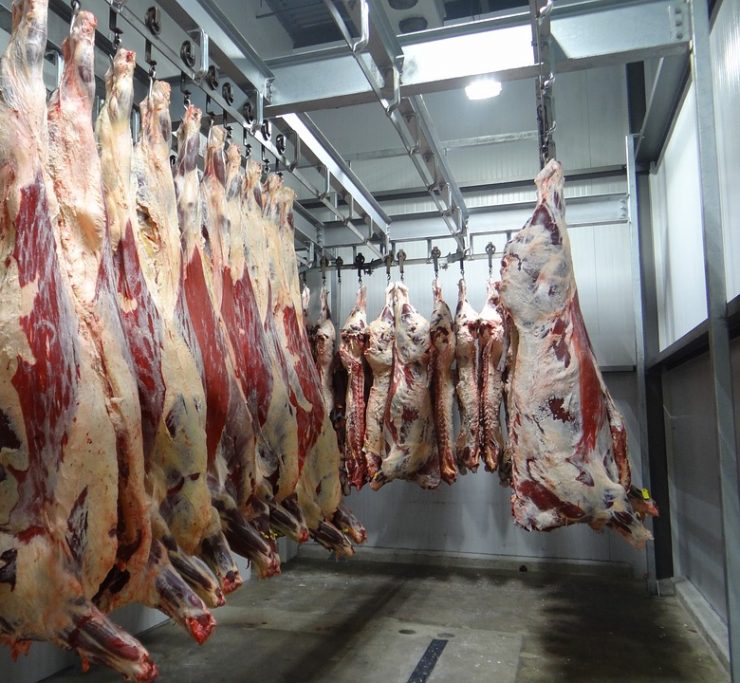Author: Yahya ŞENOL, Ph.D. in Theology.
Editor of Fetva.net
Translator: Sıla KARACAN
ANIMALS SLAUGHTERED WITHOUT UTTERING BASMALA[1]
The ruling on eating the meat of animals slaughtered without saying Bismillah is one of today’s most discussed halal food issues. Scholars belonging to the Hanafi, Maliki, and Hanbali sects accepted the 121st verse of Surah al-An’am as evidence, thus concluding that the Basmala is obligatory (fard) in the slaughtering process and that the meat of animals slaughtered without Basmala is forbidden (haraam) to eat. On the contrary, in the Shafii sect, it is not obligatory to utter Basmala while slaughtering, so animals slaughtered without Basmala are also lawful (halal) to eat.
Indeed, the two opposite views above base themselves on the same verse, verse 121 of Surah al-An’am. Those who defend that Basmala is obligatory, translate the relevant verse as “Do not eat of what is not slaughtered in God’s name. For that would certainly be fisq (an act of disobedience)…”. If we interpret the verse in this way, it would be forbidden to eat animals over which God’s name is not pronounced while they are slaughtered, and those who eat the meat of these animals would be fasiq[2]. Those who state that Basmala is not obligatory, say that it is wrong to translate and understand the verse in this way, because it does not concern the animals slaughtered without Basmala, rather the animals slaughtered with the mention of a name other than God’s.
In this article, we will read Surah al- An’am verse 121 without going into too much detail. Still, we will try to conclude whether it is necessary to utter Basmala while slaughtering animals by considering it from different angles[3].
- In Terms of Arabic Language
Let’s examine the first part of surah al-An’am, verse 121 in Arabic, which is the subject of the discussions:
وَلَا تَأْكُلُوا مِمَّا لَمْ يُذْكَرِ اسْمُ اللَّهِ عَلَيْهِ وَإِنَّهُ لَفِسْقٌ
We have stated that those who consider Basmala obligatory in animal slaughter translate the verse in two separate sentences: “Do not eat of what is not slaughtered in God’s Name. For that is certainly fisq…”. In contrast, those with opposing views said that it is wrong to translate the verse in this way.
When we examine the verse in terms of the Arabic language, we see a translation and comprehension error here. Hence a wrong ruling is set. Here are the errors:
Those who consider Basmala as a requisite have accepted the expression “certainly that is fisq (وَإِنَّهُ لَفِسْق)“ as conjoined to the sentence[4] before it due to the letter “waw” at the beginning. However, this is not possible in terms of the Arabic language. Because this expression “وَإِنَّهُ لَفِسْق” is a circumstantial (hal) clause in the sentence, and it restricts the prohibition of eating to the condition that the slaughtered animal is fisq/an act of disobedience.
Hatib al-Shirbini, one of the Shafii jurists, stated that this sentence could not be conjoined to the previous one because there is a complete contradiction (tabayun) between the two in terms of rules of the Arabic language. The reason for contradiction is that the sentence “Do not eat… (وَلَا تَأْكُلُوا مِمَّا لَمْ يُذْكَرِ اسْمُ اللَّهِ عَلَيْه)” is jumla inshaiya/sentence with a jussive verb; while “it is fisq (وَإِنَّهُ لَفِسْقٌ)” is jumla khabariyaa/nominal sentence. According to the established syntax (nahw) rules, it is not correct to conjoin these two sentences to each other. Shirbini says, due to the position of the letter waw at the beginning, the sentence “وَإِنَّهُ لَفِسْق” can not be an answer to a question (that is likely to be asked or expected to come), either. Therefore, there is no other possibility than the waw here being waw al-hal/waw that introduces a circumstantial clause[5]. So, the prohibition in verse is not about slaughter without Basmala, but about the slaughtered animal being fisq. The way this fisq occurs is also explained in the Book of God. Verse 145 of Surah al-An’am manifests: “those which are slaughtered by mentioning the name of any other than God.”
We know that Imam Shafii, the imam of one of the four main schools of Islamic jurisprudence, is also of this opinion. He states, what is meant by the phrase “Do not eat…(وَلَا تَأْكُلُوا مِمَّا لَمْ يُذْكَرِ اسْمُ اللَّهِ عَلَيْه)” are animals slaughtered for idols:
“God’s command, which is included in the continuation of surah al-An’am verse 121, ‘If you follow them, you will also certainly become mushrik,’ is about people who eat of the animals sacrificed in the name of idols. In other words, ‘if you are willing to eat the meat of animals slaughtered in the name of idols, it means that you also consent to the divinity of those idols. And this requires that you associate partners with God (commit shirk)’.”
As for the concept of fisq in the verse, Shafii said, “We have researched in God’s Book when it would be considered fisq”. Citing the phrase “أَوْ فِسْقًا أُهِلَّ لِغَيْرِ اللَّهِ بِه” in the 145th verse of Surah al-An’am as evidence, he stated that the concept of ‘fisq’ is interpreted as ‘an animal that is fisq because it was slaughtered by mentioning the name of any other than God.’
Fakhr al-Din al-Razi, one of the famous Quranic exegesis scholars, also thinks it is not obligatory to utter Basmala while slaughtering animals. And based on the 121st verse of Surah al-An’am, he says, “This verse is not in their favor as they think, but in our favor,” and makes the following explanations:
“It is not possible to say that the letter waw here is the waw of conjunction. This is because, “Do not eat… (وَلَا تَأْكُلُوا)” is a verb phrase, and “it is fisq (وَإِنَّهُ لَفِسْقٌ)” is a noun phrase; and it is unpleasant to conjoin a noun phrase to a verb phrase unless in a state of necessity. When it becomes clear that waw cannot be for conjunction here, its option of being “haliyya/circumstantial” remains (…)
Additionally, in this verse, the reason for being fisq is left mujmal/implicit and is not explained. However, in verse 145 of the same Surah, we see the expression ‘an animal that becomes fisq because it was slaughtered by mentioning the name of any other than God’. And the fisq in 121st verse is explained with the expression ‘those which are slaughtered by mentioning the name of any other than God’[6].”
These explanations are correct. Then, paying regard to the rules of the Arabic language, the meaning of the verse should be as follows:
“If it is certain that the animal slaughtered without pronouncing the name of God is fisq, do not eat it!”
When the meaning is assigned in compliance with the rules of the Arabic language, it becomes clear that the verse does not mention the animals slaughtered without Basmala but rather the animals slaughtered by uttering the name of any other than God. When there is no doubt that they were slaughtered in this way, that meat must never be eaten.
- In Terms of the Concept of Fisq
Another proof that Basmala is not obligatory in slaughtering animals is the concept of fisq in the verse. This refers to the animals slaughtered by mentioning the name of any other than God in the 145th verse of Surah al-An’am. In other words, whoever deliberately eats the meat of an animal that is slaughtered in a name other than God has accepted the existence of a deity other than Him. This behavior will make him a fasiq, which is another expression of abandoning the religion. Otherwise, eating the meat of animals that are slaughtered without saying Basmala does not make a person fasiq. Imam Nawawi[7] stated there was a consensus among the ummah that eating the meat of animals slaughtered without Basmala would not be considered an act of fisq. Alusi, one of the Quranic exegesis scholars, also said that committing acts that are subject to ijtihad[8] would not fall within the scope of fisq[9].
The complete verse, which is the subject of discussion, is as follows:
“Do not eat (of animals) over which God’s name is not pronounced as fisq (a deliberate sin). Certainly, devils (of human and jinn) incite their allies to strive against you. If you obey them, you surely become mushrik (who associate partners with God).” (al-An’am 6:121)
As we can see, the concept of ‘shirk’ is also mentioned in the verse together with the concept of ‘fisq’. It is a crucial detail as it shows that we should consider the matter in the context of tawhid (unity of God) or shirk (polytheism). Hence, approving of a person who slaughters an animal by mentioning a name other than God’s and stringing along with him by eating the meat of that animal will undoubtedly make a person a mushrik. The matter is important. Therefore, we should re-state that the verse does not concern whether you utter Basmala, but rather, whether you mentioned a name other than God’s as you slaughter the animal.
- In Terms of the Unity of the Surah
In addition to verse 121, Surah al-An’am also contains other verses which prove that animals that are fisq must not be eaten because the name of someone other than God is mentioned during the slaughter. God the Almighty decrees in verses 118 and 119 of this Surah:
“If you are believers of His signs/verses, eat of the things over which God’s name has been pronounced.
And why should you not eat of that over which God’s name has been pronounced, seeing that He has explained to you in detail what He has forbidden you (to eat) unless you are compelled (to do so)? But, behold, many people lead others astray following their own desires, without (having any real) knowledge. Verily, your Master knows well those who transgress the bounds[10].” (al-An’am 6:118-119)
In the translation of these verses, it is stated that the things forbidden to eat are explained in detail. This detailed explanation is made in verse 145 of the same Surah as the following:
“(O Muhammad!) Say: I cannot find in what has been revealed to me anything forbidden for anyone who wants to eat unless it is carrion, blood poured forth, the flesh of swine -it is impure-, or that which is slaughtered in a name other than God’s as fisq. (…)” (al-An’am 6:145)
This verse states that there is no food of animal origin forbidden to eat other than animals that have died without being slaughtered, blood poured forth, the flesh of swine, and animals that are fisq because the name of someone other than God is mentioned. It is clear that animals slaughtered without Basmala are not included in this verse, and there is no contradiction between the verses. In other words, what is told in one verse is not forgotten in the other verse. We want to remind you once again of the very accurate statements of Imam Shafii and Fakhr al-Din al-Razi: “The concept of fisq in this verse explains what the concept of fisq is in verse 121“. Hence, the unity of the Surah clearly shows that among the forbidden food of animal origin, those slaughtered without Basmala are not included. The animals mentioned in the 121st verse of Chapter An’am are animals that are known to be fisq, that is, they are surely known to be slaughtered by mentioning the name of someone other than God.
- In Terms of the Unity of the Qur’an
It is not only Surah al-An’am verse 145 in which haraam foods of animal origin are described, but also in al-Baqarah verse 173, al-Maida verse 3, and an-Nahl verse 115. Animals slaughtered without Basmala are not included in any of them. All of these four verses state that only these four foods of animal origin are haraam: dead animals, blood, the flesh of swine, and those slaughtered by mentioning the name of someone other than God.
If uttering Basmala was obligatory, it would certainly be included in the verses in which the same things are mentioned over and over again, as “And those which are not slaughtered in the name of God/which are slaughtered without saying Basmala.” However, even in the 3rd verse of Surah al-Maida -which is known as the final verse of the Quran, and where the haraams are repeated for the last time – the slaughter is emphasized in the statement “except for what you slaughter,” but Basmala is not mentioned. It is for sure that God -subhanahu wa ta’ala- is far from forgetting what He has said in Chapter An’am verse 121!
When we look at the unity of the Qur’an, Basmala, which is the mention of the name of God, has been commanded and/or recommended in two situations. One in the ritual animal sacrifice[11] and the other in hunting[12]. The obligation of uttering Basmala is explicitly stated in the verses related to these cases by using the expression “mention the name of God over it!”. Nevertheless, it is not mentioned in the Quran that Basmala should be mentioned in the slaughtering process of meat animals in regular times.
As a result, we have concluded that it is not obligatory (fard) to utter Basmala in animal slaughter, it is sunnah[13], and animals that are slaughtered without Basmala can also be eaten. The following authentic hadith also reinforces this conclusion:
A group of Companions came to Prophet Muhammad and said: “O Messenger of God! Some people bring us meat. We do not know whether they have mentioned God’s name on it or not. Shall we eat that meat or not?”. He gave the following answer:
“Mention the name of God over it and eat!”[14]
While muhaddith and linguistician Khattabi said: “This hadith is proof that it is not an obligation to utter Basmala when slaughtering animals. If it was a condition, the animal which was in doubt, would not be accepted as permissible…[15]“; Muhallab ibn Abi Sufra also said the following on the subject:
“This hadith is the source of Basmala not being obligatory. Because the Basmala that they say before eating replaced the Basmala that was not uttered during the slaughter. And this proves that it is a sunnah. Because no sunnah can replace the fard… .”[16]
You can download this article in PDF here.
———————————————————–
[1] The Turkish original of the article was published in volume 8, issue 3 of the periodical “Kitap ve Hikmet” (Kitap ve Hikmet Dergisi Sayı 30). The English article was published in volume 9, issue 3 of the periodical “Kitap ve Hikmet” (Kitap ve Hikmet Dergisi Sayı 34).
[2] Fasiq (فاسق) is an Arabic term referring to someone who intentionally and constantly transgresses the clearly prescribed boundaries set by Allah. The basic verb derived from the referred root means “disobeyed”.
[3] Those who want to learn more about the subject can refer to our academic article titled “The Issue of Basmala in Animal Slaughter” published in the Journal of Islamic Law Studies (issue: 31, year: 2018, p. 491-508).
[4] The sentence “Do not eat of what is not slaughtered in the name of Allah (وَلَا تَأْكُلُوا مِمَّا لَمْ يُذْكَرِ اسْمُ اللَّهِ عَلَيْه)”
[5] Hatib ash-Shirbini, Mughni’l-Muhtaj, Egypt, 1958, v: 4, p. 272.
[6] Fakhr al-Din al-Razi, Manakib al-Imam al-Shafi, Egypt, 1986, p. 536-538.
[7] Imam Nawawi, Al-Majmu’, Beirut, t.y., v: 8, p. 237
[8] Ijtihad: In Islamic law, the independent or original interpretation of problems not precisely covered by the Qurʾan, Hadith (words of Prophet Muhammad), and ijmaʿ (scholarly consensus).
[9] Shehabaddin al-Alusi, Ruhu’l-Maani, Cairo, 2005, v: 8, p. 353.
[10] Since Surah An’am was revealed in Mecca, these verses show that during the Meccan period, Muslims did not eat the meat of animals slaughtered in the name of Allah by the mushrik. Because the mushrik would not mention the name of Allah over some of the animals they slaughtered (An’am 6:138) but the name of someone other than Him (An’am 6:145). Although the verses are very clear, the sects of fiqh have agreed that it is forbidden (haraam) to eat what the mushriks slaughter! However, what is forbidden is not every animal slaughtered by the mushrik, rather the animals that they slaughter in the name of any other than Allah. Since the mushrik slaughtered those animals on stones (nusub) for this purpose, those known to have been slaughtered on those stones are also haraam. See al-Maidah 5:3.
[11] Surah al-Hajj, 22:28, 34, 36
[12] Surah al-Maida, 5:4
[13] According to the reliable information in the hadith sources, Prophet Muhammad (PBUH) did not advise to pronounce Basmala only while slaughtering animals, but also before eating a meal, taking wudhu, wearing clothes, riding, lowering the corpse to the grave, entering and leaving the house, locking the doors, covering the utensils, and even before the intercourse of husband and wife. All of these show that saying the name of Allah, when starting something that is not haraam, is a strong sunnah that our Prophet did not omit.
[14] Bukhari, “Tawhid”, 13, “Zabaih”, 21; Abu Dawud, “Adahi”, 13–19; Ibn Majah, “Zabaih”, 4.
[15] Shawkani, Nayl al-Awtar, v: 8, p. 158.
[16] Shawkani, ibid, v: 8, p. 158.








Add comment